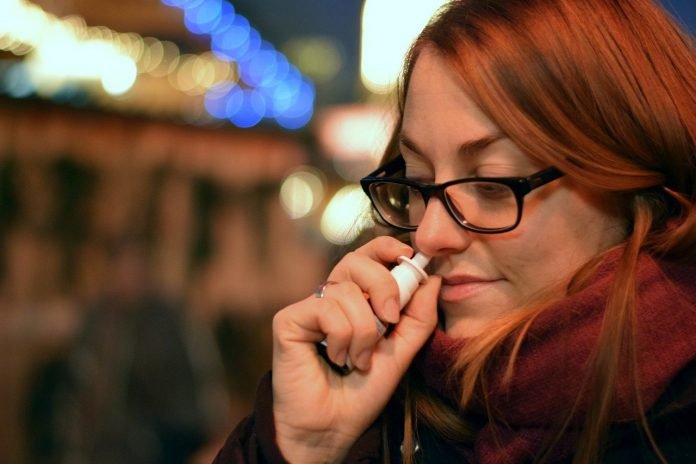
A new study from Cornell University found a newly discovered small molecule could be sprayed into people’s noses to prevent COVID-19 illness prior to exposure and provide early treatment if administered soon after infection.
They found the molecule, called N-0385, inhibited the entry of the virus into cells in the body.
The treatment holds promise for both preventing disease and reducing the severity of and mortality from COVID-19 post-infection with a few single daily doses.
The study is published in Nature and was conducted by Hector Aguilar-Carreno et al.
There are very few, if any, small molecule antivirals that have been discovered that work prophylactically to prevent infection
The broad-spectrum therapy was tested in mice exposed to the first strain detected in the U.S. in Washington state in 2020, as well as the Delta strain, but has not been tested on the Omicron variant, though the researchers are optimistic it will remain effective.
In the study, the team introduced the small molecule intranasally into the mice before, during, and/or after infection.
They found the therapy prevented the mice from losing weight, prior to coronavirus exposure, and from dying post-infection. Even up to 12 hours after infection, the treatment showed very good efficacy.
The team says the N-0385 therapy is simpler and less expensive to mass-produce than other types of COVID-19 treatments, such as monoclonal antibodies.
The hope is that the treatment could be submitted for FDA emergency-use approval within a minimum of six months.
Recent studies have found green tea may offer new hope to beat COVID-19, and these existing drugs may help treat COVID-19, which are highly relevant to the current study.
Sign up for our newsletter for more information about this topic.
Previous research has developed a nasal spray method to fight COVID-19.
In a study published in the journal Pharmaceutical Research, researchers found that a slight increase in solution pH might be all it takes to turn a metabolic inhibiting drug, traditionally used to treat gut parasites, into a promising nasal spray and early treatment throat spray for COVID-19.
Since 1958, niclosamide has been used to treat gut parasite infections in humans, pets and farm animals.
In recent years, however, researchers have been testing niclosamide’s potential to treat a much wider range of diseases, such as many types of cancer, metabolic diseases, rheumatoid arthritis and systemic sclerosis.
They have found the drug could be a potent antiviral medication, inhibiting a virus’s ability to cause disease by targeting the energy supply of the host cell that the virus co-opts for its self-replication.
In the current study, the team says when used in conjunction with vaccines, masking and other recommended mitigation measures for COVID prevention, the new niclosamide solution holds potential as an adjunct strategy.
To find out how effective and tolerable niclosamide might be for human use to fight COVID-19, the team turned to cells that were more pertinent to the initial nasal and bronchial infection—respiratory epithelial cells—and engaged other clinical researchers at Duke.
They found that just a few micromolar concentrations of the drug can lower energy levels enough to potentially cut virus reproduction completely without harming the cells themselves.
The researchers then tested human airway cells treated with just the buffered niclosamide solution.
They found niclosamide is not easily dissolved into water-based liquids that can be sprayed into a person’s nose and mouth.
The drug’s normal attainable solution concentration at a nasal pH of around 6 or 7 is close to, or even less than, what the benchtop studies suggest is required to stop the virus from replicating in cells without protective mucus.
The team estimated that a solution concentration that is about 10 times greater than that typically attainable is needed to produce a functioning prophylactic and treatment spray, and that it can get through the mucus layer in a matter of milliseconds.
They demonstrated that raising the solution’s pH to a slightly alkaline pH of 8.0—acceptable for a nasal spray—can dissolve enough niclosamide to meet the requirement of calculations.
And raising the pH to 9.2, which is still tolerable for a throat spray, beats that benchmark by 10 times more and could be used in early infection.
While promising, these results still need to be tested in cells actually infected with COVID-19, as well as in such cells protected by a mucus layer, which requires finding partner labs and agencies with the required biocontainment resources and live virus.
If you care about COVID, please read studies about existing drugs that can kill COVID-19 virus, and many Americans take immune-weakening drugs that may lower COVID vaccine response.
For more information about COVID, please see recent studies about drug duo that could help cure COVID-19, and results showing this plant extract can inhibit COVID-19 virus.
Copyright © 2022 Knowridge Science Report. All rights reserved.




